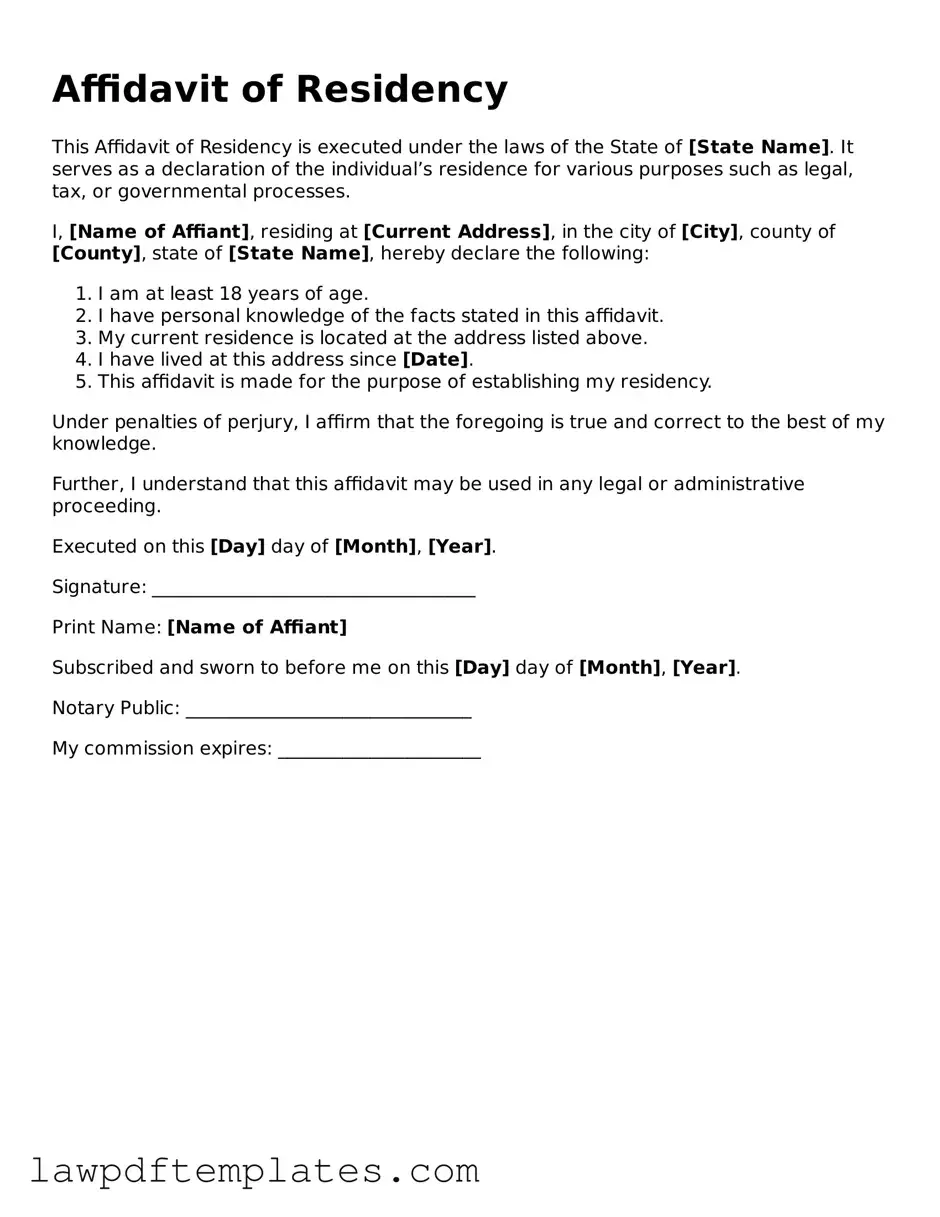Attorney-Approved Affidavit of Residency Document
Form Breakdown
| Fact Name | Description |
|---|---|
| Purpose | The Affidavit of Residency form is used to verify an individual's residence for various legal and administrative purposes. |
| State-Specific Forms | Many states have their own versions of the Affidavit of Residency, tailored to meet local requirements. |
| Governing Laws | In some states, the use of this form is governed by specific statutes or regulations that outline its purpose and requirements. |
| Signature Requirement | The form typically requires the signature of the individual affirming their residency, often in the presence of a notary public. |
Sample - Affidavit of Residency Form
Affidavit of Residency
This Affidavit of Residency is executed under the laws of the State of [State Name]. It serves as a declaration of the individual’s residence for various purposes such as legal, tax, or governmental processes.
I, [Name of Affiant], residing at [Current Address], in the city of [City], county of [County], state of [State Name], hereby declare the following:
- I am at least 18 years of age.
- I have personal knowledge of the facts stated in this affidavit.
- My current residence is located at the address listed above.
- I have lived at this address since [Date].
- This affidavit is made for the purpose of establishing my residency.
Under penalties of perjury, I affirm that the foregoing is true and correct to the best of my knowledge.
Further, I understand that this affidavit may be used in any legal or administrative proceeding.
Executed on this [Day] day of [Month], [Year].
Signature: ___________________________________
Print Name: [Name of Affiant]
Subscribed and sworn to before me on this [Day] day of [Month], [Year].
Notary Public: _______________________________
My commission expires: ______________________
Common mistakes
Filling out the Affidavit of Residency form can be a straightforward process, but several common mistakes can lead to complications. One frequent error is providing incomplete information. Every section of the form must be filled out accurately. Missing details can delay processing and may require resubmission.
Another mistake involves incorrect dates. It is essential to ensure that the dates entered are accurate and correspond to the residency period being claimed. A simple typographical error can lead to confusion and may jeopardize the validity of the affidavit.
People often overlook the requirement for signatures. The affidavit must be signed by the person affirming their residency. Failing to sign the document can render it invalid. Additionally, some individuals may forget to have the affidavit notarized, which is a crucial step in the process.
Providing outdated or incorrect identification information is another common pitfall. It is vital to use current identification that matches the name and address provided in the affidavit. Discrepancies can raise questions and complicate the verification process.
Some applicants mistakenly assume that the affidavit is a one-size-fits-all document. It is important to tailor the affidavit to meet the specific requirements of the entity requesting it. Different organizations may have varying criteria for residency verification.
Finally, neglecting to review the completed form before submission can lead to errors that could have been easily corrected. A thorough review helps ensure that all information is accurate and complete. Taking the time to double-check can save time and prevent potential issues down the line.
Consider Popular Types of Affidavit of Residency Documents
Proof of Single Status Usa - The affidavit is typically straightforward and easy to complete.
For those looking for a convenient way to access the necessary documentation, the PDF Documents Hub provides the Texas Vehicle Purchase Agreement form, ensuring that all parties involved can review and understand the specifics of the transaction before signing.
